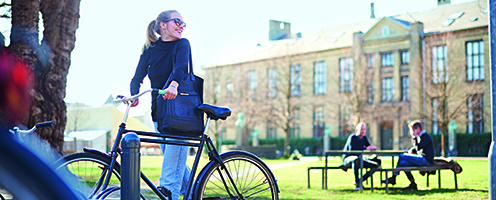Find the programme structure that fits your year of admission on your Study Information.

Programme Structure
The programme is international. You will learn of our food culture and food preferences, of sensory quality and aesthetics, of the composition of food and drinks, and of the theories of composing food and meals.
You will solve scientific as well as everyday problems related to changing our dietary behaviour and the nutritional problems from the evidence-based health recommendations.
With a starting point in a plant-based diet, it is possible to work with sustainability. An innovative collaboration with external parties is also possible; former students have developed meatballs with seaweed, tempeh with legumes, snack bars with insects, sausages with plant proteins, or made products based on food waste such as crisps from brewers' spent grain.
During the programme, you can choose optional courses and thereby form your education according to your personal interests and career plans.
You finish your education with a thesis, where you will be working on an academic topic by your choice. You can either write an experimental thesis or a theoretical analysis.
Teaching
We use different forms of teaching and vary between lectures, problem-based learning, as well as both theoretical and practical exercises. You will be working both independently and in project groups.
As a student in the MSc programme in Food Innovation and Health, you will have the opportunity to participate in the ‘Gastronomic Playground’, which is a student-based association, who among other things arrange events at a high gastronomic level.
The group has access to a large gastronomic laboratory (experimental kitchen), where students can meet with student chefs, professional chefs and fellow students from other study programmes. Here, you can experiment with food and techniques – and thus contribute to substantiating, subverting, and taunting our notions of food.
Do a Project in Practice or Study Abroad
While studying, you will have plenty of possibilities for collaborating with the food industry and others, e.g. by doing a project in practice. The collaboration can give you both relevant competencies and an interesting network. It is also possible to study abroad as part of the programme.
Programme Overview, Thesis 30 ECTS
Compulsory courses: 60 ECTS
Elective courses: 30 ECTS
Master's thesis: 30 ECTS
| Block 1 | Block 2 | Block 3 | Block 4 | |
|---|---|---|---|---|
| Year 1 | Bioactive Food Components and Health | Elective | Food and Meal Consumer Research | |
| Advanced Nutrition Physiology and Metabolism | Food Science and Culinary Techniques | Elective | Entrepreneurship and Innovation | |
| Year 2 |
Thematic Course in Food Innovation and Health | Elective | Thesis | |
| Elective | ||||
One block equals nine weeks of study and 15 ECTS.
Programme Overview, Thesis 45 ECTS
Compulsory courses: 60 ECTS
Elective courses: 15 ECTS
Master's thesis: 45 ECTS
| Block 1 | Block 2 | Block 3 | Block 4 | |
|---|---|---|---|---|
| Year 1 | Bioactive Food Components and Health | Elective | Food and Meal Consumer Research | |
| Advanced Nutrition Physiology and Metabolism | Food Science and Culinary Techniques | Elective | Entrepreneurship and Innovation | |
| Year 2 |
Thematic Course in Food Innovation and Health | Thesis | ||
Curriculum
Learn more about the programme in the Curriculum for MSc in Food Innovation and Health.
Shared section of the curriculum for all programmes at the Faculty of SCIENCE.
